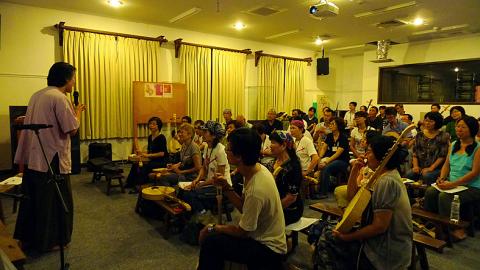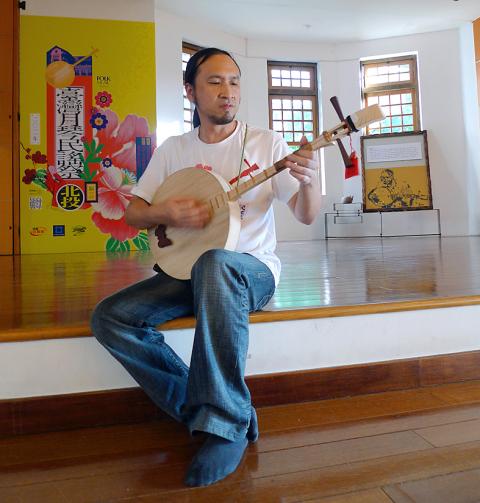Beitou District (北投), famed for its hot springs, is doubling as host to a musical feast this weekend. The Taiwan Moon Lute Folk Music Festival (台灣月琴民謠祭) comprises concerts tomorrow and Sunday at the Beitou Hot Springs Museum by a slew of the country’s top folk musicians.
The new festival began earlier this month with a series of lectures by folk virtuosos, who demonstrated the two-string instrument’s widespread use in Taiwanese music.
Iconic musician Chen Ming-chang (陳明章), who organized the event, said the moon lute, or yueqin (月琴), is a representative instrument of Hoklo music and commonly used in a variety of genres: Gezai opera (歌仔戲); Hengchun folk music (恆春調); nanguan (南管); beiguan (北管); chia-ko (車鼓); and liam kua (唸歌), a Taiwanese performance art form that interweaves talking and singing.

Photo courtesy of Taiwan Moon Lute Folk Music Association
“The yueqin is to Taiwan as the samisen is to Japan, or morin khuur to Mongolia,” Chen said, referring to stringed instruments from those countries. “It represents our culture’s most classical characteristics. I hope one day people will come to Taiwan to see yueqin or liam kua shows, just like we go to see samisen or kabuki shows when visiting Japan.”
Tomorrow evening there will be an open jam session with renowned musicians, including Chen and Lin Sheng-xiang (林生祥), that is open to anybody who wants to show off his or her yueqin skills.
Chen said the instrument generates a distinctive sound that is somewhat similar to that of blues music. Because of its simplicity, the yueqin’s timbre is more fluid and flexible than that of more elaborately designed Chinese instruments.

Photo courtesy of Taiwan Moon Lute Folk Music Association
“After Zheng Chenggong (鄭成功, better known as Koxinga) and his gang came to Taiwan, it was unlikely that they would go back to China just to buy a musical instrument. They were poor and could only use what was available at hand. They put together some wood planks, and now you have this simple tool that can produce amazingly complex music,” said Chen, who has taught yueqin to some 200 students in Beitou over the past two years.
On Sunday, octogenarian folk legends including Chu Ting-chun (朱丁順), under whom Chen has studied yueqin and Hengchun folk tunes, as well as Yang Hsiu-ching (楊秀卿) and Wang Yu-chuan (王玉川), both of whom are highly revered liam kua virtuosos, will perform.
Hailing from Yunlin County, the Wu Tien-lo (吳天羅) family’s Hsuyang Chia-ko Troupe (旭陽車鼓劇團) will show Taipei audiences the art of chia-ko, a type of grassroots operatic theater that combines song, dance, spoken dialogue and drama.
All of the festival performances will take place on the lawn outside the museum’s main building.
Aside from the musical performances, an exhibition of hand-painted moon lutes will run through Oct. 2 inside the museum, which was built in 1913 during the Japanese colonial era and designated as a heritage site in 1997. It is located a short, pleasant walk from Xinbeitou MRT Station (新北投捷運站).

The 2018 nine-in-one local elections were a wild ride that no one saw coming. Entering that year, the Chinese Nationalist Party (KMT) was demoralized and in disarray — and fearing an existential crisis. By the end of the year, the party was riding high and swept most of the country in a landslide, including toppling the Democratic Progressive Party (DPP) in their Kaohsiung stronghold. Could something like that happen again on the DPP side in this year’s nine-in-one elections? The short answer is not exactly; the conditions were very specific. However, it does illustrate how swiftly every assumption early in an

Francis William White, an Englishman who late in the 1860s served as Commissioner of the Imperial Customs Service in Tainan, published the tale of a jaunt he took one winter in 1868: A visit to the interior of south Formosa (1870). White’s journey took him into the mountains, where he mused on the difficult terrain and the ease with which his little group could be ambushed in the crags and dense vegetation. At one point he stays at the house of a local near a stream on the border of indigenous territory: “Their matchlocks, which were kept in excellent order,

Jan. 19 to Jan. 25 In 1933, an all-star team of musicians and lyricists began shaping a new sound. The person who brought them together was Chen Chun-yu (陳君玉), head of Columbia Records’ arts department. Tasked with creating Taiwanese “pop music,” they released hit after hit that year, with Chen contributing lyrics to several of the songs himself. Many figures from that group, including composer Teng Yu-hsien (鄧雨賢), vocalist Chun-chun (純純, Sun-sun in Taiwanese) and lyricist Lee Lin-chiu (李臨秋) remain well-known today, particularly for the famous classic Longing for the Spring Breeze (望春風). Chen, however, is not a name

There is no question that Tyrannosaurus rex got big. In fact, this fearsome dinosaur may have been Earth’s most massive land predator of all time. But the question of how quickly T. rex achieved its maximum size has been a matter of debate. A new study examining bone tissue microstructure in the leg bones of 17 fossil specimens concludes that Tyrannosaurus took about 40 years to reach its maximum size of roughly 8 tons, some 15 years more than previously estimated. As part of the study, the researchers identified previously unknown growth marks in these bones that could be seen only